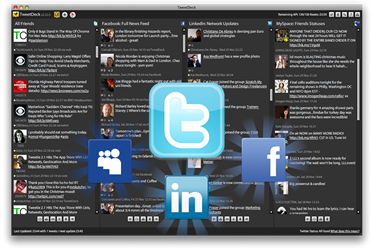- You are here:
- Home
- Social Media
- Who’s in an Author’s Community?
 Chris Brogan talks, in his article yesterday, about Paul Coelho and Scott Westerfeld using the social web to engage their communities in a way that enables readers to congregate, and to participate in the creative energy surrounding a book like never before. While doing this, these guys create real relationships which always amount to the classic Win-Win Situation we all shoot for.
Chris Brogan talks, in his article yesterday, about Paul Coelho and Scott Westerfeld using the social web to engage their communities in a way that enables readers to congregate, and to participate in the creative energy surrounding a book like never before. While doing this, these guys create real relationships which always amount to the classic Win-Win Situation we all shoot for.
When authors take the time to be present – to engage in a dialogue instead of a monologue – amazing things can indeed happen, but an author has got to know how to listen, who to listen to, and when to speak up.


And while readers represent a critically vital facet of every author’s community, it’s important to consider the other essential pillars of your Author Presence in the book world.
So now who’s your community?
When helping an author frame the answer to this question, I ask them to categorize their connections on the social web into three broad categories:
- Readers – people who will buy their book
- Colleagues – Collaborators and other authors with whom they share shelf space
- Connectors – Booksellers, book bloggers, traditional freelance reviewers, and anybody else who makes a living talking about authors like them.
When you begin to consider the way people fall into these broad, and then more sharply defined categories, you’ve taken the first step toward “listening” and engaging more effectively.
Let’s start with Twitter. You cannot “listen” to your Twitter community effectively if you don’t employ some form of a Twitter management application. Period. I’m tired of hearing people tell me over and over that they can’t make sense of Twitter, only to thank me with a bottle of Jameson as soon as they spend a few days using TweetDeck.
Please don’t make me beg, just trust me on this one.
Once you’ve installed your TweetDeck you can start creating Groups into which you’ll slot the people you follow on Twitter. You can always delete and add groups, so don’t be afraid of making a mistake. Try starting off with these groups:
- The Machine – these are the people who impact your career directly; your agent, editor, publicist, and marketing person at your publisher, your spouse, and anybody else who helps you on a regular basis.
- Colleagues – the other authors on your shelf
- Booksellers
- Book Bloggers
- Agents – other agents
- Publicists – other publicists
- Publishers
Consider for a moment what’ll result from this more focused level of listening.
- You’ll find out what your readers “look” like; what websites they push around, the other authors they like and dislike, other online communities they frequent, the music they listen to, the TV shows they watch and so much more.
- You’ll learn a ton about the book business that doesn’t have anything to do directly with you, but will make you better at the business end of the business.
- You’ll discover the real people behind bookselling all over the world, and come to better understand what they really need from you as an author.
- You’ll learn more about your market, enabling you to be a better author for your publisher.
None of this will make you a better writer, but it’ll make you a stronger, smarter author.
When you’ve listened enough and begin to engage, what’ll happen then?
- You’ll have countless opportunities to help others by retweeting, posting their stuff on Facebook, including them and their ideas in your blog posts, answering questions, making suggestions, and contributing to their conversations.
- You’ll become part of other communities by virtue of your participation and contributions.
- Collaboration will occur.
- Ideas will proliferate.
- Booksellers and book bloggers will come to “know” you.
- You’ll be easier to find.
- You’ll extend the shelf life of your book.
- You’ll create opportunities for meaningful relationships, both personal and business that’ll extend far beyond 140 characters.
- You’ll be present.
Oh yeah, you’ll grow your readership too.
Wanna take it to the next level?
Have a monthly Twitter chat where you talk about something specific to your work, and answer a few FAQs. Use these chats as an opportunity to point people to websites – not always your own – where more detailed background info awaits them.
- Feature guest authors in your market space; reach high sometimes, but include up-and-comers too.
- Provide participants with exclusive content, like downloadable short stories, signed book plates or pre-order premiums on your next book.
- Invite follow up DMs and include hooks for your next blog, chat, or appearance.
- Ask for suggestions.
- Find out what else people are reading.
- Strengthen your cross ties by reminding participants to connect with you on Facebook, Indiebound, LinkedIn, Goodreads and LibraryThing.
- Participate in other authors’ chats on Twitter.
As usual, this is just the tip of the social iceberg. There are so many creative ways to provide value through social channels, yet every one of these activities is nothing more than a single step toward a deeper, more mutually beneficial level of engagement with your market, your colleagues, and your readers.
Your army.
Now go download TweetDeck and start playing around with it. Check out the following video for a quick tutorial. And please don’t forget to connect with me on Twitter.
Related Posts
Facebook Ads – An Effective Way to Jumpstart Your Businesses Marketing
Join me, Donald Maass, Jonathan Maberry and Bobbi Carducci at the 2013 Pennwriters Conference
The Brandywine Valley Writers Group Presents, Social Media for Writers
Social Media for Writers at the Princeton Public Library
Introducing Mingl Social – A Delaware Valley Social Media Marketing Agency
How to Get More Likes, Comments and Shares on Facebook – A Dan Zarrella Joint
Talking about the Social Media B2C Landscape at SoMeBizLife
The Mystery Writers of America presents, Social Media for Antisocial Authors
